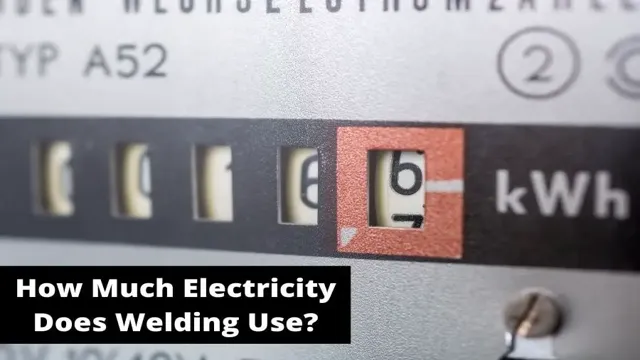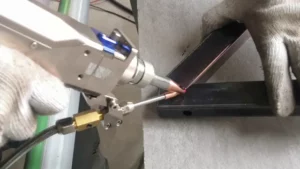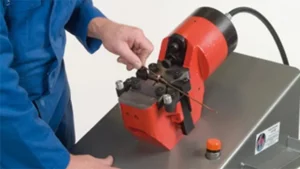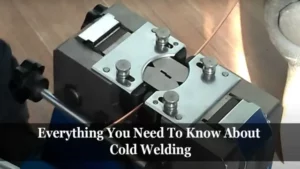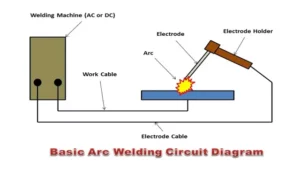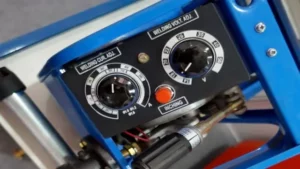A welding machine is a valuable asset for any welder, whether you are just starting or have been in the industry for years. However, when looking to purchase one, the cost can be quite overwhelming. As a result, it is crucial to take into account certain factors that can impact the price point.
In this blog, we will explore the key factors that you need to consider when it comes to welding machine cost. By the end, you will have a better understanding of what to expect and how to make an informed decision about your welding machine purchase. So, let’s dive in!
Types of Welding Machines
“How much does a welding machine cost?” is a common question among those who are interested in learning welding or are looking to purchase a welding machine. Welding machines can vary in cost depending on the type and size one needs. For instance, a basic MIG welding machine can cost anywhere between $200-$500, while a more complex TIG welding machine can cost upwards of $1000.
Welding machines with more features such as digital controls and advanced technology tend to be more expensive. However, it’s important to keep in mind that investing in a quality welding machine can save you money in the long run by reducing the need for repairs or replacement. It’s also important to factor in additional costs such as welding accessories, safety equipment, and training materials.
Overall, the cost of a welding machine depends on the specific needs and budget of the buyer.
Shielded Metal Arc Welding (SMAW)
When it comes to Shielded Metal Arc Welding (SMAW), there are various types of welding machines that can be used to achieve the desired results. One of the most common types of welding machines used in SMAW is the constant current (CC) machine. This machine is typically used for stick welding and is best suited for welding thick metals and creating deep penetration welds.
Another type of welding machine used in SMAW is the constant voltage (CV) machine. This machine is ideal for welding thin metals and is often used for welding sheet metal. In addition to these machines, there are also machines that operate on both CC and CV modes, giving welders greater flexibility and control.
Ultimately, the choice of welding machine will depend on the specific welding job at hand, the materials being used, and the level of expertise of the welder. However, by choosing the right machine, welders can create strong, long-lasting welds that are designed to withstand even the toughest conditions.

Gas Tungsten Arc Welding (GTAW)
Gas Tungsten Arc Welding (GTAW) When it comes to welding, choosing the right machine is essential to achieving a quality weld. There are various types of welding machines available on the market, each with its specific advantages and disadvantages. For Gas Tungsten Arc Welding (GTAW), commonly known as Tungsten Inert Gas welding, an inverter-based welding machine is highly recommended.
This type of machine can adjust the electrical output to suit the specific welding task, which improves the efficiency and accuracy of the welding. Another type of welding machine that can be used for GTAW is the transformer-based welding machine. However, this type of machine is less forgiving, and the welder must have a higher level of skill to operate it effectively.
All in all, the welding machine chosen for GTAW should match the needs of the welding project and the skill level of the operator to ensure a successful outcome.
Gas Metal Arc Welding (GMAW)
When it comes to gas metal arc welding (GMAW), choosing the right welding machine is crucial for achieving quality welds. There are several types of GMAW welding machines available on the market, each with its own unique features and capabilities. The most common types of GMAW welding machines include transformer-based machines, inverter-based machines, and pulsating current machines.
Transformer-based machines are the most traditional and widely used type of machine. They are dependable, durable, and have a simple design. Inverter-based machines are the latest technology and are more energy-efficient, lighter, and smaller than transformer-based machines.
Pulsating current machines have the ability to produce both alternating and direct current, providing greater versatility in welding different types of metals. Ultimately, the choice of welding machine will depend on the specific needs and requirements of the welding job at hand. Whatever machine is chosen, it must be able to provide a consistent, reliable, and high-quality weld.
Flux-Cored Arc Welding (FCAW)
Flux-cored arc welding (FCAW) When it comes to welding machines, there are several types for different welding techniques. One of the most popular types is the flux-cored arc welding or FCAW machine. FCAW is a type of wire-feed welding where a hollow wire electrode is fed through the welding gun and into the joint.
Unlike other welding techniques that use a shield gas to protect the weld pool, FCAW uses a flux-cored wire that automatically releases its shielding gas upon contact with the welding arc. This makes the FCAW machine ideal for outdoor welding where wind and other weather elements can easily blow away the shield gas used in other welding techniques. There are two types of FCAW machines: self-shielded and gas-shielded.
Self-shielded FCAW machines are portable and do not require the use of a shielding gas. They are ideal for outdoor welding works, such as pipelines, where the welder needs to move from one location to another. Gas-shielded FCAW machines, on the other hand, use a shielding gas to protect the weld pool.
They are more complex than the self-shielded FCAW and require a constant supply of shielding gas. Gas-shielded FCAW machines are ideal for welding thicker materials and for welding indoors, where there is less wind and an enclosed space. In summary, there are different types of welding machines for different welding techniques, and when it comes to FCAW, there are self-shielded and gas-shielded machines.
The type of FCAW machine to use will depend on the welding requirements, the work environment, and the materials to be welded.
Brand and Model
If you’re looking to purchase a welding machine, one of the first questions you might have is, “how much does a welding machine cost?” The price of a welding machine varies greatly depending on the brand and model. A basic entry-level machine can cost anywhere from $200 to $500, whereas a high-end industrial-level machine can cost upwards of $10,000. It’s important to keep in mind that the cost isn’t always reflective of the quality of the machine but rather the features and capabilities it has.
When considering cost, also think about what type of welding you’ll be doing, the size of the machine, and any additional accessories or equipment you might need. As always, it’s important to do your research and read reviews to make sure you’re getting the right machine for your needs and budget.
Popular Welding Machine Brands
When it comes to welding machines, there are a ton of brands to choose from, each with their own unique models and features. One popular brand is Miller, with their Bobcat, Trailblazer, and Thunderbolt series. These machines are known for their reliability and ease of use.
Lincoln is another well-known brand, with their Power MIG and Ranger series. These machines offer a wide range of power and output options, making them versatile for various welding projects. ESAB is also a top contender, with their Rebel and ET series.
These machines boast advanced technology and can handle a variety of welding processes. Other popular brands include Hobart, Everlast, and Forney, each offering their own unique set of features and benefits. Whether you’re a professional welder or a DIY enthusiast, there’s a welding machine brand and model out there that’s perfect for your welding needs.
Cost Range of Different Brands and Models
When it comes to purchasing a new laptop, cost is always a major factor to consider. Different brands and models come with varying price ranges, and it can be overwhelming to choose which one is right for you. One popular brand with a higher cost range is Apple, with their MacBook starting at around $1,000 and going up to over $2,000.
Another high-end option is Microsoft’s Surface, which ranges from $799 to $2,699 depending on the model and accessories chosen. On the more affordable end of the spectrum, there are options like the HP Stream at around $200 or the Lenovo IdeaPad at around $500. It’s important to keep in mind that while a higher cost may indicate better performance and features, it’s essential to assess your own needs before making a decision.
New vs. Used Welding Machines
When it comes to purchasing a welding machine, one of the primary factors to consider is cost. New welding machines can be quite expensive, with prices varying depending on the type and brand. For example, a new TIG welder can range anywhere from $500 to over $10,000.
On the other hand, used welding machines can often be found at a lower cost, depending on their condition. While purchasing a used machine can be a great way to save money, it is important to do your research and be cautious of any potential issues. Make sure to inspect the machine thoroughly and ask for any maintenance records or repair history.
Ultimately, the decision between a new or used machine will depend on your budget and specific needs.
Pros and Cons of Buying New and Used Machines
When it comes to buying welding machines, there are pros and cons to both new and used options. New machines offer the latest technology, reliability, and warranties, but they can be more expensive. Used machines, on the other hand, are often more affordable but may not come with a warranty and could require repairs or maintenance.
When deciding between new and used welding machines, it ultimately comes down to your budget and needs. If you have the financial means to invest in a new machine and want the latest features and reliability, then a new machine is probably the best option for you. However, if you are on a tight budget or only need the machine for occasional use, a used machine might be the way to go.
That being said, it’s important to do your research and make sure you are purchasing from a reputable seller. Ask questions about the machine’s history, any previous repairs or maintenance, and whether or not it comes with a warranty. It’s also a good idea to test the machine before making a purchase.
Ultimately, whether you choose to buy new or used, make sure the machine meets your specific needs and will help you get the job done efficiently and effectively.
Where to Buy Welding Machines
If you’re looking to buy a welding machine, you might be wondering how much they typically cost. The truth is, the price of a welding machine can vary widely depending on factors such as the brand, type, and power output. A basic, entry-level stick welder can cost as little as $200, while a more advanced TIG welder can run upwards of $1,000.
For industrial-grade welders, the price can reach into the tens of thousands of dollars. It really just depends on what you need the machine for, and what your budget is. One thing to keep in mind is that price doesn’t always equal quality.
Just because a machine is more expensive doesn’t necessarily mean it’s the best option for you. Do your research, read reviews, and make sure you’re getting a machine that meets your specific needs at a price point that you’re comfortable with.
Local Suppliers vs. Online Retailers
When it comes to purchasing a welding machine, you may be faced with the question: should you buy from local suppliers or online retailers? Both options have their pros and cons, so ultimately it depends on your personal preferences. Local suppliers may offer personalized customer service and the benefit of being able to physically inspect the machine before buying. However, their prices may be higher due to their smaller scale operations and limited inventory.
On the other hand, online retailers often have a wider selection of products and can offer lower prices due to their larger scale operations and ability to source from multiple suppliers. However, you may have to sacrifice personalized customer service and the ability to physically inspect the machine before purchasing. Ultimately, it boils down to balancing convenience, cost, and personal preference when deciding where to purchase your welding machine.
Trustworthy Online Stores for Welding Machines
Welding machines are essential tools for both professional welders and DIY enthusiasts. If you are looking to buy a welding machine, it is important to find a trustworthy online store that offers high-quality products and reliable customer service. One of the best places to start your search is on Amazon.
With a wide selection of welding machines from reputable brands such as Lincoln Electric and Miller Electric, Amazon offers competitive prices and fast shipping. Other online stores that specialize in welding equipment include Welding Supplies from IOC and Cyberweld. These stores offer a vast selection of welding machines, accessories, and safety gear from leading brands at competitive prices.
It is crucial to do your research and read online reviews before making a purchase to ensure that you are getting a reliable and efficient welding machine that meets your needs. With the right online store, buying a welding machine can be a hassle-free experience.
Final Thoughts
If you’re looking to purchase a welding machine, you’re probably wondering how much it’s going to cost you. Well, the cost of a welding machine can vary depending on the type of machine you’re looking for. For example, a basic, entry-level MIG welder can cost as little as $200, while a more advanced TIG welder can cost upwards of $2,000.
You’ll also need to factor in the cost of accessories like helmets, gloves, and gas tanks. Ultimately, the cost of a welding machine depends on your needs and usage. If you’re a beginner or just need it for simple DIY projects, a cheaper model may suffice.
However, if you’re a professional welder or plan on using it frequently, it’s worth investing in a higher-end model that will last and provide better results.
Conclusion
As a wise man once said, “You get what you pay for.” The same holds true when it comes to welding machines. The cost of a welding machine is dependent on a variety of factors, including its size, power, and features.
While it may be tempting to opt for a cheaper option, investing in a high-quality welding machine can pay off in the long run with better performance, durability, and reliability. So, whether you’re a professional welder or a DIY enthusiast, remember that the cost of a welding machine is a reflection of its value.”
FAQs
What is the average cost of a welding machine?
The average cost of a welding machine can vary depending on the type and brand, but typically ranges from $200 to $2000.
Is it cheaper to buy or rent a welding machine?
It depends on how often you will use the welding machine. If you only need it for a short-term project, renting may be cheaper. However, if you will use it frequently, buying may be a better investment.
What factors affect the cost of a welding machine?
The type, brand, features, and power output of a welding machine can all impact its cost. More advanced or specialized machines may cost more.
Are there any additional costs associated with owning a welding machine?
Yes, there may be additional costs such as maintenance, replacement parts, and electricity usage.
Can I find used welding machines for a cheaper price?
Yes, it is possible to find used welding machines for a lower price. However, it is important to inspect the machine and ensure that it is in good condition before purchasing.
Are there any brands that offer budget-friendly welding machines?
Yes, there are several brands that offer lower-priced welding machines, such as Lincoln Electric, Hobart, and Forney.
What is the minimum power output I should look for in a welding machine?
The minimum power output required will vary depending on the type of welding you will be doing. However, a welding machine with a power output of at least 120 amps should be sufficient for most basic welding tasks.
